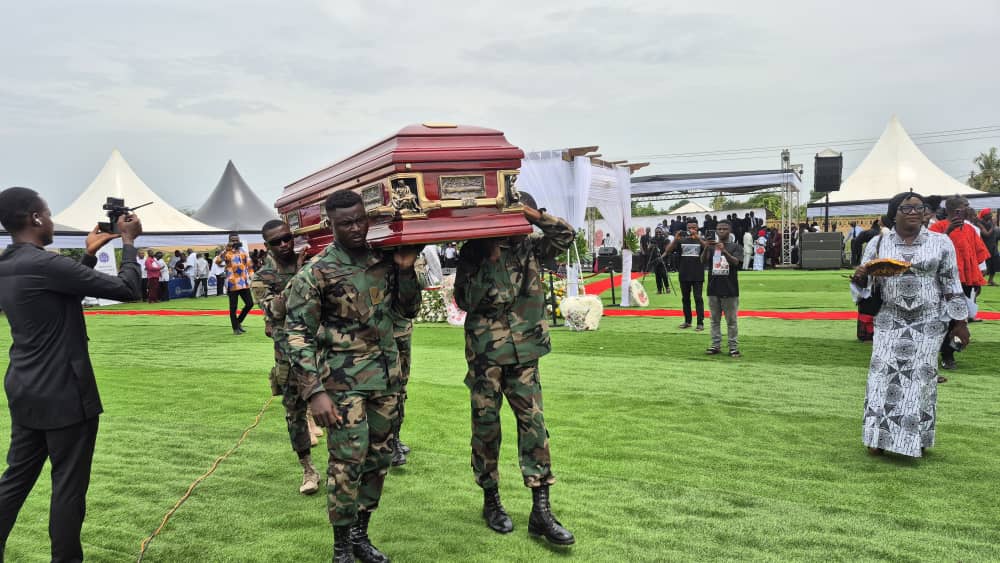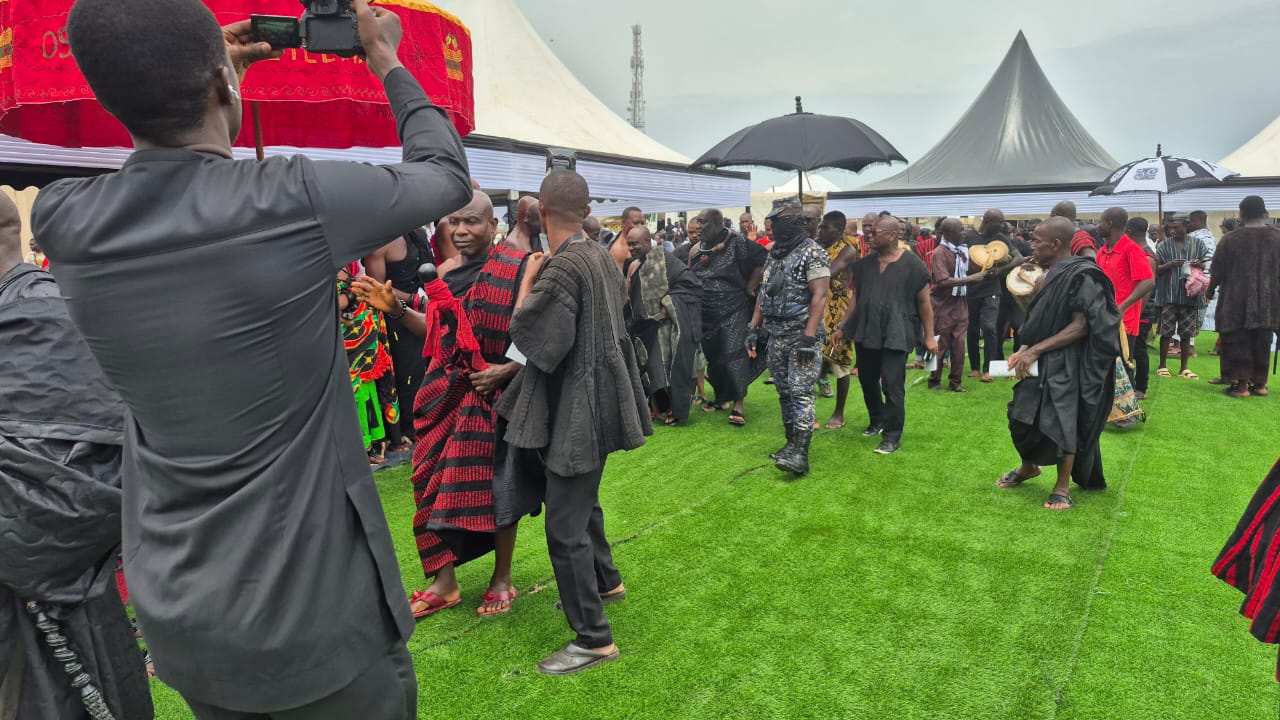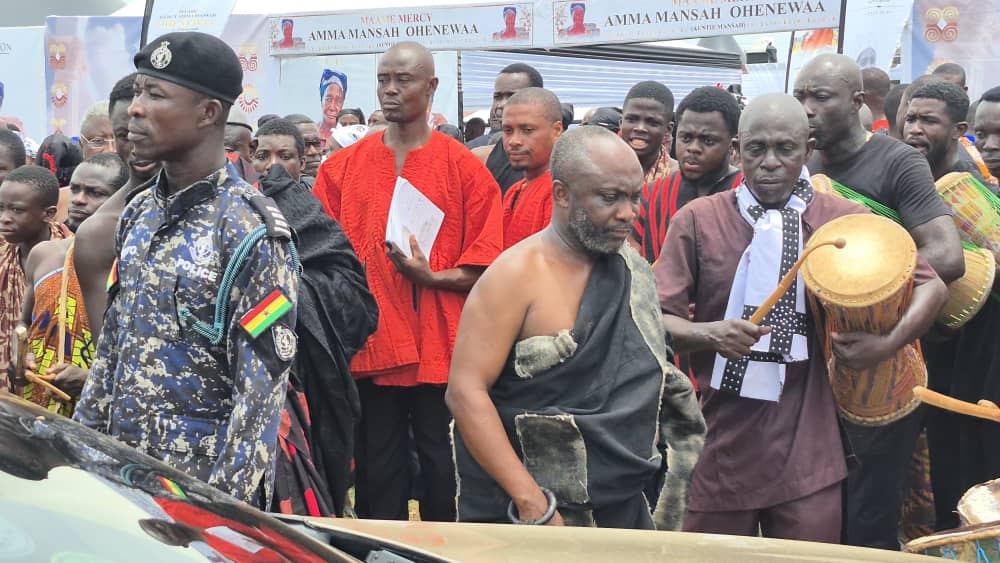Maame Mercy Amma Mansah Ohenewaa, the late mother of His Lordship Nana Barima Yaw Kodie Oppong, Director of the Ghana School of Law, was laid to rest in a solemn and dignified ceremony at Akyem Oda on Saturday, March 22.
The funeral drew a large gathering of mourners who paid their final respects through heartfelt tributes and reflections on her life and legacy.
The burial service was attended by distinguished guests, including traditional rulers, prominent politicians, members of the judiciary, family members, students of the Ghana School of Law and well-wishers.
Born around 1923 in Akyem Asuboa in the then Gold Coast, Maame Mercy Amma Mansah Ohenewaa was the beloved daughter of Opanin Kwame Botwe, a successful cocoa farmer, and Maame Abena Korang, a dedicated trader and farmer, both of blessed memory.
As a Saturday-born, she was given the traditional female day name, Amma, and as the third of eleven children, she was also named Mansah, signifying her birth order.
Her passing marks the end of a remarkable life, fondly remembered by those whose lives she touched.

Profile of Maame Mercy Amma Mansah Ohenewaa
Raised in a devout Apostolic Christian family, she received the baptismal name Mercy, reflecting the grace and love that would come to define her life.
Auntie Mansah was blessed with ɛfie nyansa (native wisdom), obuo (respect), and anidie (reverence), qualities that radiated from her graceful presence. Her striking beauty was undeniable – she had a slim, delicate figure ‘obi ne ahoma tea”, an ever-smiling round face, and charming dimples that made her uniquely unforgettable.
Despite her many gifts, Auntie Mansahh was not fortunate enough to receive formal Western education. This flows from the fact that education reached the Akyem Kotoku paramountcy late, and even when it arrived in Akyem Oda during the 1910s-1920s, it took years to spread to nearby villages like Asuboa.

Nevertheless, like many young girls of her generation, she received a rich indigenous education. From a tender age, she learned household chores, etiquette, cultural traditions, and farming – skills that prepared her for life’s responsibilities.
Young Mansah diligently assisted her parents on the farm throughout her childhood, and upon reaching adulthood, after a brief sojourn in Akyem Oda, she relocated to Akyem Ntronang, where she embarked on a journey as a trader, showcasing her entrepreneurial spirit and resilience. Known for her sharp mind and practical outlook on life, Auntie Mansah abandoned petty trading early on and pursued an apprenticeship as a seamstress.

After all, as the saying goes, Emmrɛ daneɛ na wonso wo adane wo ho bi – “When situations change, you must also change to fit in.”
After completing her apprenticeship, she opened her own seamstress shop in town and took up farming alongside her craft. Her mastery of the famed “Singer” sewing machine, effortlessly spinning the handle to produce exquisite, fashion-forward designs, catapulted her to “Edith Head” in the community. Beloved by many in the community, Auntie Mansah’s warmth and skill left an indelible mark on those around her. Among her cherished friends was Maame Abena Adusa, who has since passed away but remains fondly remembered in the stories of their shared moments.

In the course of her seamstress-cum-agribusiness life, Auntie Mansah met and fell in love with Opanin Yaw Oppong (now deceased), a dashing and ambitious young Agricultural Extension Officer with the Ministry of Food and Agriculture (MOFA), who hailed from Akyem Oda.
The two lovebirds quickly tied the knot, honoring Akan customary marriage traditions with joyful celebrations. Their union blossomed, and they were blessed with six children: three (3) boys and three (3) girls.
As her family grew, Auntie Mansah’s entrepreneurial spirit burned even brighter. She diversified her business ventures by stepping into bread-making – a decision that skyrocketed her popularity. Her renowned brand of tea bread became the most coveted in town, with people traveling from surrounding communities just to get a taste.

Over decades as a veteran baker, Auntie Mansah’s home transformed into a haven for the needy.
Many hungry souls found solace in her kindness, as she never turned anyone away, offering bread to those who knocked on her door regardless of their ethnicity or religion. She became a true matriarch, a beacon of generosity whose compassion stretched beyond her immediate family.
Her children, the lucky firsthand beneficiaries of her breadmaking mastery, eagerly devoured her hot, oven-fresh bread. They paired it with their beloved Tea Mpapa – a thick, milk-rich tea made of her favourite Bournvita or Milo, they perfected over time.

Awww, Sewaa Mansah, wo na na woyɛ anufo kɛseɛ mbofra ɛtwa ho ahyia, “Aww, Auntie Mansah, you were the big breast that children surround to suckle.” Her life was a testament to love, resilience, and an unyielding commitment to nurturing everyone around her.
Maame Mansah understood the transformative power of education. Though she never had the opportunity to receive formal schooling herself, she emerged as a beacon of hope and enlightenment in her community, championing the cause of education for her children, grandchildren and even some of the great grand children. She spared no effort in providing the necessary support – both material and emotional – to help them reach their highest potential.

Her visionary dedication bore remarkable fruit, most notably in the achievements of Nana Barima Yaw Kodie Oppong, who is the Manwerehene of the Akyem Abuakwa Traditional Area, the Director of Legal Education and Director of the Ghana School of Law, and, above all, a Justice of the Court of Appeal.
Auntie Mansah’s life was deeply rooted in her unwavering faith in the Almighty Jehovah. A devout Christian, she was a staunch member of Apostle Newman Peter Anim’s Christ Apostolic Church International (CACI). She never compromised her commitment to church activities, attending every service without fail.
Although she was baptized as a child in the Church of Pentecost at Akyem Asuboa, she transitioned to the Christ Apostolic Church International after resettling in Akyem Ntronang. Her faith was palpable – she was often seen, lantern in hand, making her way to morning devotions and evening services.

Maame Mansah firmly believed in the boundless power of God and ensured her entire household grew up steeped in Christian teachings and values. Her guiding scripture was Proverbs 22:6: “Train up a child in the way he should go, and when he is old, he will not depart from it.”
For her, morality was non-negotiable – she nurtured not just her family but the entire community, leaving an enduring legacy of kindness, faith, and an unrelenting belief in the value of raising children in a Godly manner.

Auntie Mansah was known for her unwavering firmness, her devotion to truth, and her tireless efforts to maintain peace and unity within her family.
She was a natural peacemaker, always striving to mend broken ties and strengthen familial bonds. Even on her sickbed during a family visit, she called her younger brother, Mr. Isaac Kwadwo Ameyaw, and urged him to trace all family members and do everything in his power to unite them. Yet, as death is an inevitable passage of life, Auntie Mansah took her last breath on 23rd December 2025, after a short illness.
This was after all that was humanly possible was done to prolong her days on earth. Of her six beloved children, two (2) predeceased her.
Explore the world of impactful news with CitiNewsroom on WhatsApp!
Click on the link to join the Citi Newsroom channel for curated, meaningful stories tailored just for YOU:
https://whatsapp.com/channel/0029VaCYzPRAYlUPudDDe53x
No spam, just the stories that truly matter! #StayInformed #CitiNewsroom #CNRDigital
